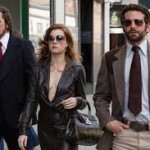By Sikivu Hutchinson
Ah the splendor of black music. What would white supremacist civilization do without it? Homegrown, soulful, it is the forbidden spice in a thousand scenes of white folk romancing, cutting loose, getting it on and minding the empire’s business. Black dynamism has always been a wellspring for white theft. For many people of color, going to 21st century movies is a soul-sucking exercise in being trained to see power through white eyes, often with the strategic pomp of a black soundtrack. Death by trailer, it is the masochistic pleasure of being bludgeoned into mental submission by the narrative of white heroism (in the form of Mark Wahlberg, Matt Damon and George Clooney), white hetero-normative romance (in the form of faceless anorexic white girls and boys slobbering over and devouring each other) and white domesticity in white picket fence communities.
Generations after psychologists Kenneth and Mamie Clark’s 1947 doll test experiment on racial identification (which has been updated several times over the past decade), children’s images of whiteness remain rigidly framed through the lens of humanity, civilization, ingenuity, genius, beauty and morality. When children of color see themselves at all in American film it is as ethnic exotica, sidekicks for the enterprising white boy/girl protagonist or fly-in-the-buttermilk diversity mascots fleshing out a classroom scene. According to a 2012 study by the USC Annenberg School, 76.3% of all speaking characters in American film were white while whites comprise 56% of U.S. ticket buyers. By contrast, Latinos comprise 26% of ticket buyers and 17% of the U.S. population, yet account for only 4.3% of speaking roles in film.
In 2013, the American film industry raked in over 10 billion in profits, plowing over people of color who now comprise the majority of California’s population. In the new film American Hustle blacks, Latinos and Arabs are the colorful backdrop to the ribald shenanigans of a cunning yet endearing white couple cruising toward redemption and nuclear family-hood in New Jersey. Continue reading “Hollywood’s Tea Party”




